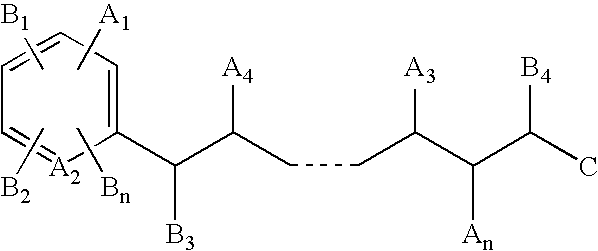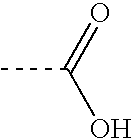Mass defect labeling for the determination of oligomer sequences
a defect labeling and oligomer technology, applied in chemical methods analysis, particle separator tube details, instruments, etc., can solve the problem of difficult sequence determination, large number of unique libraries that can be produced via combinatorial approaches, and confusion in the identification of labeled ions, so as to achieve a larger number of tags, the effect of ionization efficiency and the volatility of the resulting fragments is higher, and the detection sensitivity
- Summary
- Abstract
- Description
- Claims
- Application Information
AI Technical Summary
Benefits of technology
Problems solved by technology
Method used
Image
Examples
example 1
[0299] In this example, a high mannose-type oligosaccharide (FIG. 7) is labeled and sequenced. The oligosaccharide is labeled using methods similar to those described in Parekh, et al., U.S. Pat. No. 5,667,984. Briefly, a mass defect label (2-amino-6-iodo-pyridine (Label 1)) is covalently attached to the reducing terminus of the oligosaccharide in the presence of sodium cyanoborohydride (NaBH3CN). This incorporates a single mass defect element (iodine) into the parent oligosaccharide. The addition of the mass defect element allows the labeled oligosaccharide fragments to be distinguished from unlabeled fragments and matrix ions in the mass spectrum.
[0300] The Label 1-conjugated oligosaccharide is then aliquoted to reaction tubes containing different saccharases (see Tables 1.1 and 1.2) in appropriate reaction buffers. The reactions are allowed to proceed to completion and the resultant reaction products are conjugated at the newly formed reducing ends of the fragments by reaction w...
example 2
[0310] In this example a mass defect label is used for the identification of the fatty acid composition and arrangement in lipids, or “lipid sequencing.” This example utilizes phosphatyidylcholine; however, one of skill in the art will appreciate that these methods in combination with alternative separation methods, spot, and lipase selections can be applied to any of the saponifiable lipids as defined by Lehninger (see, BIOCHEMISTRY (Worth, N.Y., 1975)).
[0311] A lipid extract is prepared via ether extraction of an E. coli K-12 cell pellet using the method of Hanson and Phillips (see, MANUAL OF METHODS FOR GENERAL BACTERIOLOGY, p. 328, Amer. Soc. Microbiol., Washington, D.C., 1981). Ether was removed from the extract by evaporation and the lipid pellet was resuspended in a 65:25:5 methanol:chloroform:formic acid solvent system (containing 0.1% butylated hydroxytoluene to inhibit oxidation). Half the volume was spotted in each of two lanes of a scribed silica HL plate (Altech, Deerf...
example 3
[0317] This example describes the preparation of photocleavable mass defect labels having bromine or iodine substituents. These labels are useful for quantifying the relative abundances of biomolecules (e.g., nucleic acids, proteins, or metabolites) that may otherwise exhibit low ionization or detection efficiencies in the mass spectrometer. The mass defect label serves as a surrogate marker for its conjugate biomolecule in the mass spectrometer. Variations of the terminal chemistry provide means for attachment to primary amine, sulfhydryl, and carboxylic acid containing biomolecules. The inclusion of the mass defect element in the label allows the label to be unambiguously resolved from overlapping chemical noise that may be present in the sample and two samples from one another when different numbers of mass defect elements are incorporated into two labels (see also Example 1).
[0318] Briefly, 4-(tert-butyldimethylsilyl)-phenylborate ether (FT106), prepared as described by Schmidt...
PUM
| Property | Measurement | Unit |
|---|---|---|
| atomic number | aaaaa | aaaaa |
| mass | aaaaa | aaaaa |
| mass | aaaaa | aaaaa |
Abstract
Description
Claims
Application Information
 Login to View More
Login to View More - R&D
- Intellectual Property
- Life Sciences
- Materials
- Tech Scout
- Unparalleled Data Quality
- Higher Quality Content
- 60% Fewer Hallucinations
Browse by: Latest US Patents, China's latest patents, Technical Efficacy Thesaurus, Application Domain, Technology Topic, Popular Technical Reports.
© 2025 PatSnap. All rights reserved.Legal|Privacy policy|Modern Slavery Act Transparency Statement|Sitemap|About US| Contact US: help@patsnap.com



